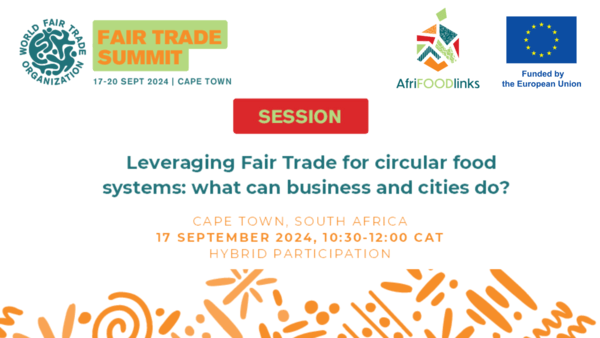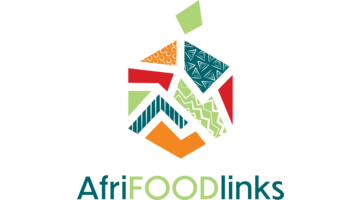Leveraging fair trade for circular food systems: what can business and cities do?
Century City Conference Centre, Cape Town, South Africa

On the occasion of the International Fair Trade Summit 2024, which took place in Cape Town from 17 to 20 September, ICLEI Europe and WFTO hosted a session titled "Leveraging fair trade for circular food systems: what can business and cities do?". Organised in the framework of the AfriFOODlinks project, this session dived into the synergies between fair trade and circularity and the benefits of integrating both approaches - for both businesses and local governments. After assessing existing challenges, the event showcased successful examples of collaboration and explores how cities can support businesses in applying circular or fair trade principles, with a focus on women and youth.
Event key takeways
- There is a clear alignment between Fair Trade and Circular Economy in the endeavor to support local economy, stable jobs for women and youth and to protect the environment. The Fair Trade Principles actually very much converge with the 7 pillars of Circular Economy - putting the emphasis on the need to go beyond simple economic value from business activity, with a view to enable companies to increase focus on their social and environmental impact (on resources, climate, biodiversity).
- Whether they be fair trade or circular, food businesses often tackle both challenges simultaneously. On the one hand, Fynbos Fine Foods - a fair trade business - thus started off as a green initiative and decided to use their fight against food waste to also alleviate the massive unemployment they found in their community. On the other hand, Nude Foods - a circular business - is in regular contact with their suppliers and transporters to encourage them to adopt fair and sustainable practices. Both examples show the extent to which fair trade and circularity intersect.
- Local governments have a great role to play in supporting these efforts, and in protecting, celebrating and showing the many innovative examples of short and local food supply chains that already exist in Africa. Cities are indeed best placed to engage all relevant stakeholders in support of fair trade and circular practices at local level, and in identifying the needed infrastructure to sustain and to replicate such food initiatives.
- Taking stock of the inspiring practices showcased during this session, AfriFOODlinks cities, local incubators and businesses will discuss how to better connect these two concepts in practice. An essential component of AfriFOODLinks will indeed be to raise awareness amongst both small and large companies on their respective role in building fair and circular food systems.
Speakers
- Mikkel Kofod Nørgård, World Fair Trade Organisation
- Luke Metelerkamp, ICLEI Africa
- Emmanuel Mossay, Circular Economy Expert
- Rozelle Abramson, Fynbos Fine Foods
- Paul Rubin, Nude Foods
- Nthakoana Maema, Oribi
- Jerôme Olivier Onguene Ntonga, City of Ebolowa
- Nele Brewaeys, City of Bruges
- Wilber Kakaire, Rikolto

